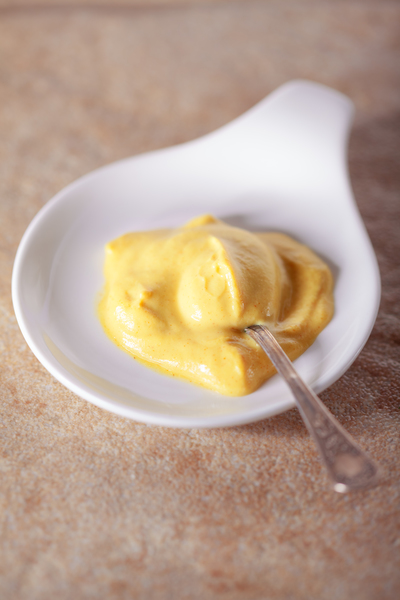Mustard

What is mustard?
Mustard is a plant that belongs to the cruciferous family. The plant has green leaves, known as mustard greens, and yellow flowers from which small seeds develop. The seeds are dried and ground to produce mustard powder, which is mixed with water, vinegar, salt and other ingredients to make different types of mustard pastes.
What forms of mustard are there?
There are many different types of mustard, which vary in taste, spiciness and composition. Some of the best known are
- Table mustard: The classic yellow mustard that is often served with sausages or meatballs. It has a mild taste and usually only contains mustard powder, water, vinegar, salt and sugar.
- Sweet mustard: A Bavarian specialty that goes well with veal sausage or Leberkäse. It has a sweet taste and contains honey or sugar as well as mustard powder.
- Dijon mustard: A French mustard that goes well with meat or cheese. It has a spicy taste and contains white wine or vinegar as well as mustard powder.
- English mustard: A British mustard that goes well with roast beef or sandwiches. It has a very pungent taste and contains turmeric or paprika as well as mustard powder.
Is mustard good or bad for dogs?
The answer to this question depends on what form of mustard you want to give your dog. The only form of mustard that can be safe and even nutritious for dogs is mustard greens. The green leaves of the plant contain many vitamins, minerals and antioxidants that can strengthen your dog's immune system. However, you should steam or boil the leaves before eating them for your dog to soften them and reduce possible contaminants.
All other forms of mustard are not suitable for dogs and can even be poisonous. This is because the seeds of the plant contain a substance called allyl isothiocyanate, which can cause gastrointestinal inflammation in dogs. The symptoms of such inflammation are vomiting, diarrhea, abdominal pain, increased salivation and loss of appetite. In addition, some ingredients in mustard pastes can be harmful to dogs, such as salt, sugar or hot spices.
What should you do if your dog has eaten mustard?
If your dog has accidentally eaten a small amount of a mild variety of mustard, you probably don't need to worry too much. Most dogs can tolerate small amounts of mustard without serious consequences. However, you should make sure your dog is drinking enough water and monitor his symptoms.
However, if your dog has eaten a large amount of a spicy type of mustard or is showing signs of gastrointestinal inflammation, you should see a vet immediately. The vet can give your dog medication to relieve the inflammation and eliminate the toxins. They can also recommend a light diet to soothe your dog's gastrointestinal tract.
Mustard is a tasty ingredient for humans, but not for dogs. The only exception is mustard greens, which can be healthy for dogs if prepared correctly. All other forms of mustard are toxic to dogs and can cause severe gastrointestinal problems. Therefore, you should not give your dog mustard and make sure that he does not steal any mustard.
If you notice any signs of hypersensitivity or poisoning in your dog, you should see your vet immediately. We are not a substitute for a vet, but we try to be as accurate as possible. Every dog reacts differently and we recommend you get a second opinion or consult your vet if in doubt.
Stay healthy and take good care of your four-legged friend!😊